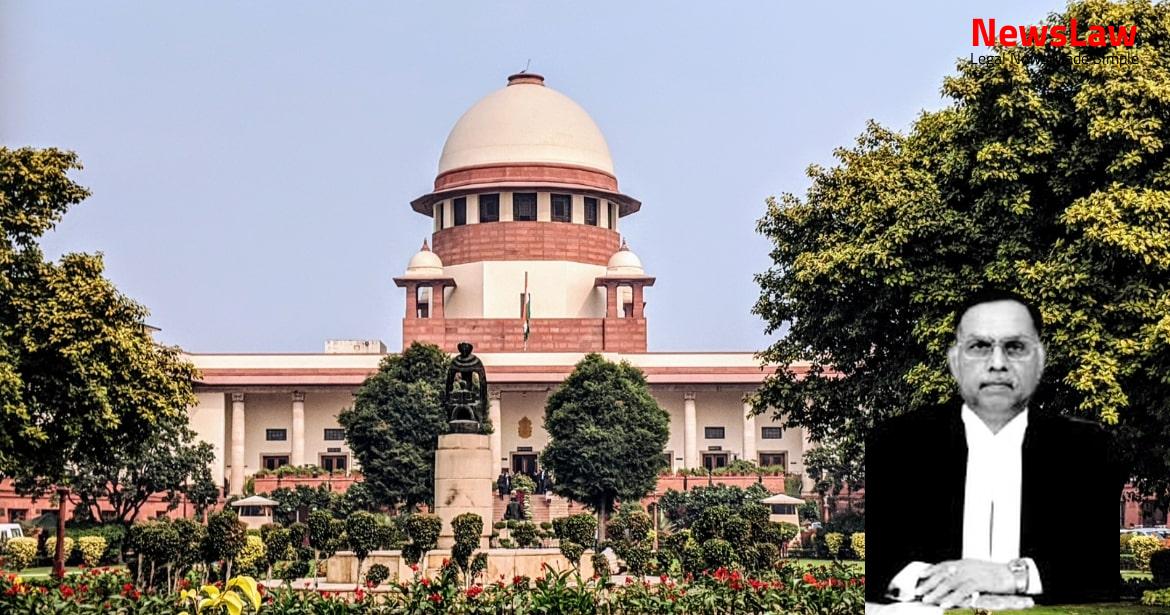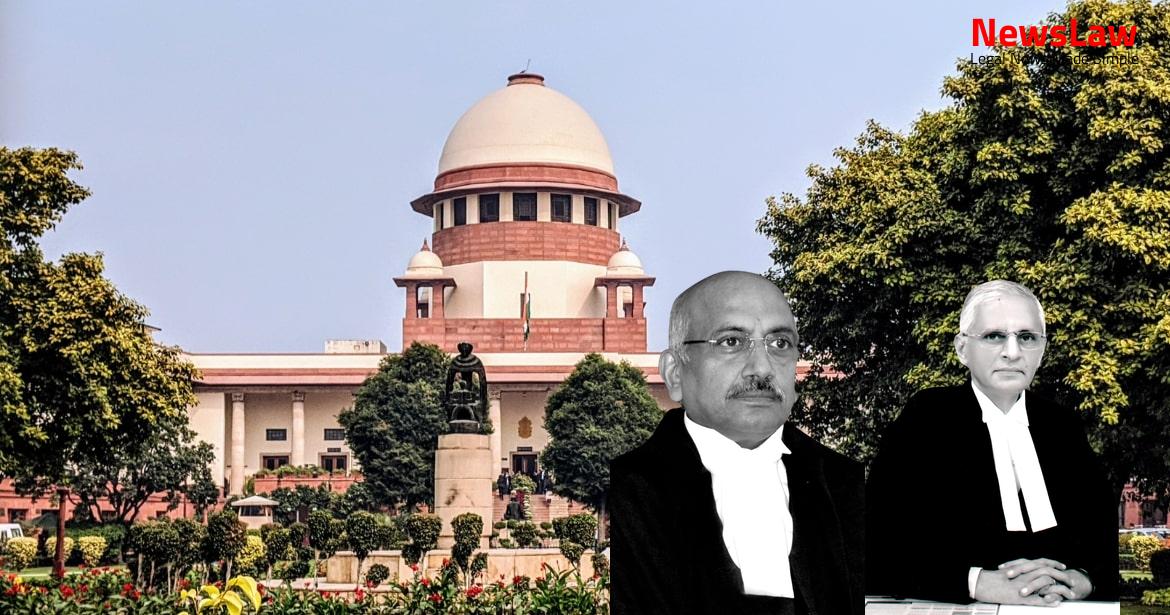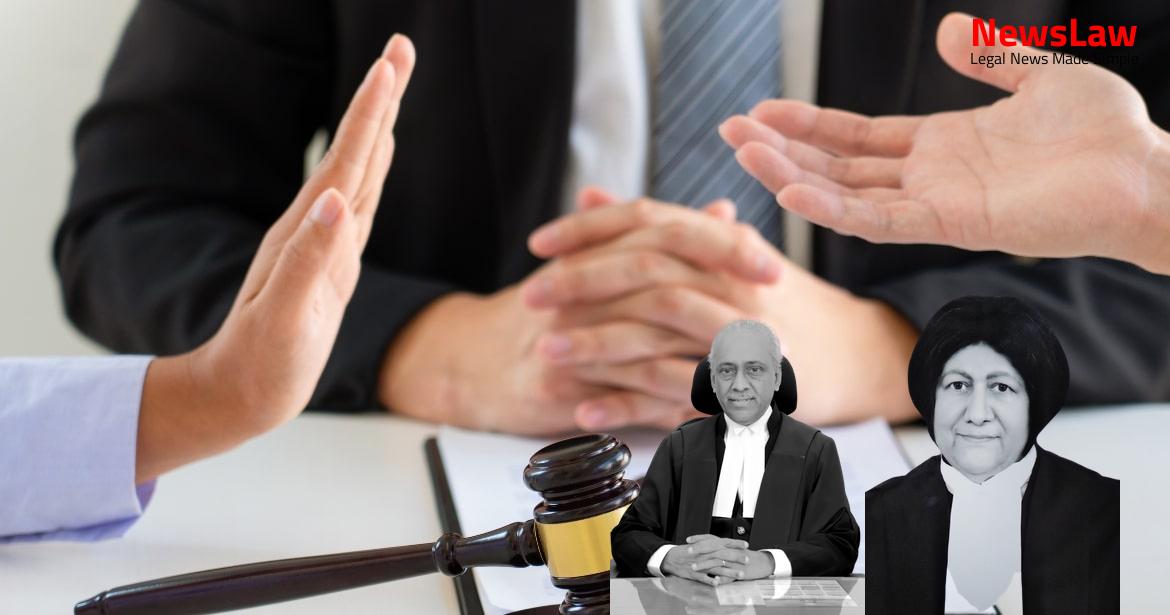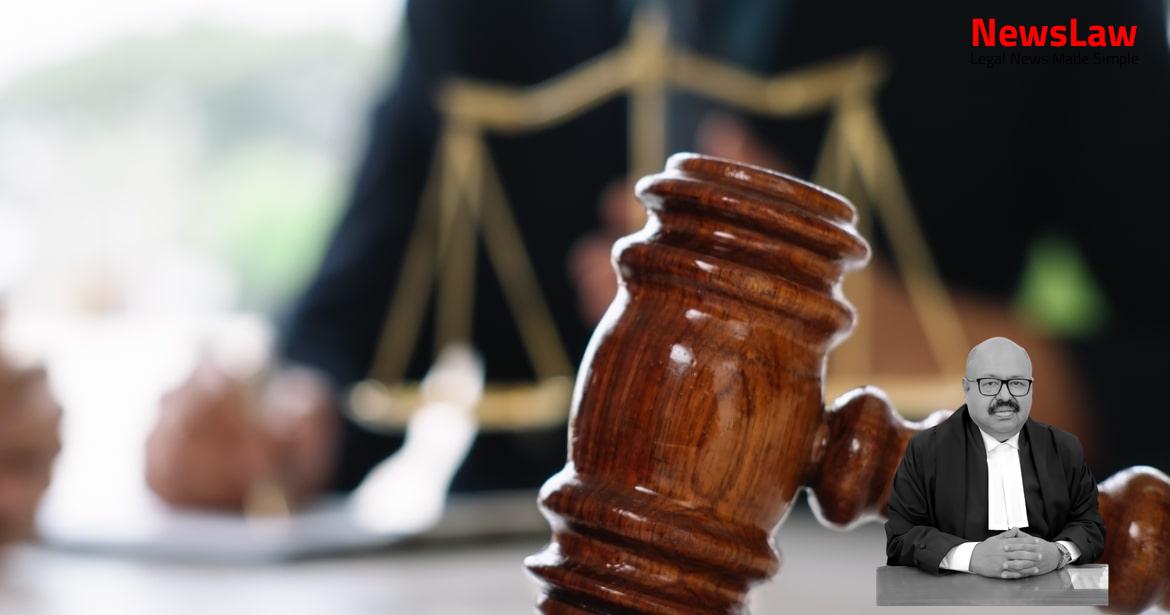Delve into the detailed legal analysis provided by the court in a recent judgment regarding the compounding of non-compoundable offences. The judgment sheds light on the complexities and nuances involved in such cases, emphasizing the importance of upholding the integrity of the legal system. Stay tuned to understand the implications of this significant legal decision.
Facts
- The accused were sentenced under Section 471 IPC read with Section 466 IPC to undergo R.I. for three years
- They were sentenced to R.I. for three months under Section 342 IPC and R.I. for one month under Section 323 IPC by the trial court judgment dated 29.08.1988
- Appeals were filed by the appellants, Mohanty and Choudhury, before the Orissa High Court against the trial court judgment
- The High Court sentenced both appellants to simple imprisonment for three months for the offence under Section 471/34 IPC
- For the offence under Section 324/34 IPC, they were sentenced to simple imprisonment for one year
- The High Court partly allowed the appeals on 09.11.2020, setting aside the conviction under Section 304 (Part II) IPC read with Section 34 IPC and Section 342/34 IPC
- The sentences were ordered to run concurrently, while their conviction under Sections 323/34 IPC and 471/34 IPC was upheld
- Both appellants were convicted under Section 324/34 IPC and sentenced to simple imprisonment for one month under Section 323/34 IPC
- Informant’s wife informed about a quarrel between Basti residents.
- Deceased had bleeding injuries on hands and necks, and swollen legs.
- Informant heard deceased’s cries but did not witness the assault.
- Informant gave water to the deceased, who had no strength to walk.
- Deceased mentioned his wife and son had filed a case before Legal Aid.
- Deceased told he would not survive and die.
- Police officer having mustache threatened to fracture deceased’s son’s limbs.
Also Read: Analysis of Seniority Determination in Armed Forces Personnel Case
Arguments
- Learned counsel for the appellants argues that the conviction under Section 324 IPC by the High Court is unsustainable.
- It is contended that the ingredients of Section 324 IPC are not established from the evidence presented.
- The injuries found on the body of the deceased were categorized as simple injuries, not aligning with Section 324 IPC.
- The suggestion is made to convert the conviction under Section 324 IPC to Section 323 IPC or substitute imprisonment with a fine.
- The appellants have already deposited a sum of Rs. 3.5 lakhs each in the Registry of the Court as per court order.
- Agreement is reached between the legal representatives and appellants’ counsel for compounding the offence under Section 324 IPC as per Section 320(2) Cr.P.C.
- Given that the offences occurred when Section 324 IPC was compoundable, and the appellants are now over 75 years old, compounding is proposed.
- Alleged weapons of offence were not shown to the prosecution witness during trial, casting doubt on the evidence.
- The weapon in question was a wooden batten/lathi, considered unlikely to cause death, thus challenging the Section 324 IPC conviction.
- The statement of PW.1-Kusia Naik was found to be only partially reliable by the High Court.
- There were material contradictions in the statement of PW.1-Kusia Naik.
- The legal representatives of the deceased agreed with the proposal made by the appellants’ counsel.
- Conviction under Section 471 IPC is not sought to be compounded as it is non-compoundable.
- The conviction under Section 324 IPC was the only focus of challenge by the appellants’ counsel.
- The State of Odisha has completed necessary procedural formalities to deposit the compensation amount directed by the High Court to the legal representatives.
Also Read: Analysis of Circumstantial Evidence in Criminal Conviction
Analysis
- The appellants have deposited Rs.3.5 Lakhs each as offered by their counsel.
- The custodial violence on the deceased is condemned as unacceptable in society.
- The offence committed was not just against the deceased but against humanity and rights guaranteed under Article 21 of the Constitution.
- Conviction under Section 324 IPC was affirmed based on evidence.
- The High Court found discrepancies in the FIR and final report submitted, indicating a false case.
- Accused were convicted for forging and fabricating records.
- The injuries on the deceased were caused by wooden lathi and batten, weapons usually possessed by the police.
- The defence plea of innocence failed based on evidence presented.
- The inquest report prepared by an accused was used for conviction.
- The nature of the offence and its impact on society are crucial factors considered in compounding offences.
- Compounding of the offence under Section 324 IPC was rejected by the court.
- Evidence showed brutal beating of the deceased by the accused at the police station.
- The accused knew their actions could cause death, leading to the offence under Section 304(Part-II) IPC.
- The request for compounding the offence under Section 324 IPC was not granted.
- The examination revealed external injuries on the deceased’s body.
- Failure to show certain materials to a witness did not impact the prosecution’s case.
- The request for compounding required court permission, not solely based on parties’ agreement.
- The High Court found evidence of injuries inflicted at the police station by the appellants.
- The judgement affirmed the convictions and dismissed the challenge against Section 371/34 IPC convictions.
- Composition for the offence cannot be allowed without the leave of the Court when the accused has been committed for trial or convicted with an appeal pending.
- Sub-Section (1) of Section 320 lists offences that can be compounded by specific persons.
- Sub-Section (2) of Section 320 allows compounding of offences under specified sections of the Indian Penal Code with the permission of the Court handling the prosecution.
- Sub-Section (5) of Section 320 reiterates that no composition for the offence shall be allowed without the Court’s permission in certain circumstances.
- Settlement/compromise can be considered for determining the quantum of sentence to be awarded to the appellants, even if the prayer for composition has been declined.
- The judgment in Ishwar Singh vs. State of Madhya Pradesh asserts that an offence punishable under Section 307 IPC is not compoundable, emphasizing the importance of public office holders upholding their trust and integrity.
- The Yashwant and others vs. State of Maharashtra case emphasizes that when the police violate the law, the punishment should be proportionately stringent to instill confidence in society.
- Administering criminal law involves a duty not only to the individual accused but also to the State and the community at large, as incidents involving police impact public confidence in the justice system.
- Several cases cited reduced sentences imposed on the accused despite the offences not being compoundable, taking into account the fact of compromise between the parties.
- A Division Bench Judgment of Nagpur High Court highlights the role of the police as protectors of law and order.
- The Court’s ability to consider the question of sentence even when the prayer for compounding the offence is refused is reiterated in the Gulab Das and others vs. State of Madhya Pradesh case.
- Consideration of compromise as a relevant circumstance during imposition of substantive sentence.
- Both appellants are over 75 years old which justifies a reduction in sentence to six months.
- Inappropriate to order compounding of a non-compoundable offence under the legal provisions.
Also Read: Constitutional Interpretation on Multi-Member Wards in Municipalities
Decision
- The sentence of one year under Section 324 IPC is reduced to six months.
- Compensation of Rs.3.5 Lakhs each is awarded to the legal heirs of the deceased.
- The compensation offered by the appellant in this Court is to be paid to the legal heirs, in addition to the compensation awarded by the High Court.
- The compensation shall be disbursed equally to two sons who are alive and heirs of two deceased sons.
- The compensation deposited in this Court will be remitted to the trial court for payment to the legal heirs of the deceased.
- The appeals are partly allowed with leave granted.
Case Title: PRAVAT CHANDRA MOHANTY Vs. THE STATE OF ODISHA (2021 INSC 80)
Case Number: Crl.A. No.-000125-000125 / 2021



